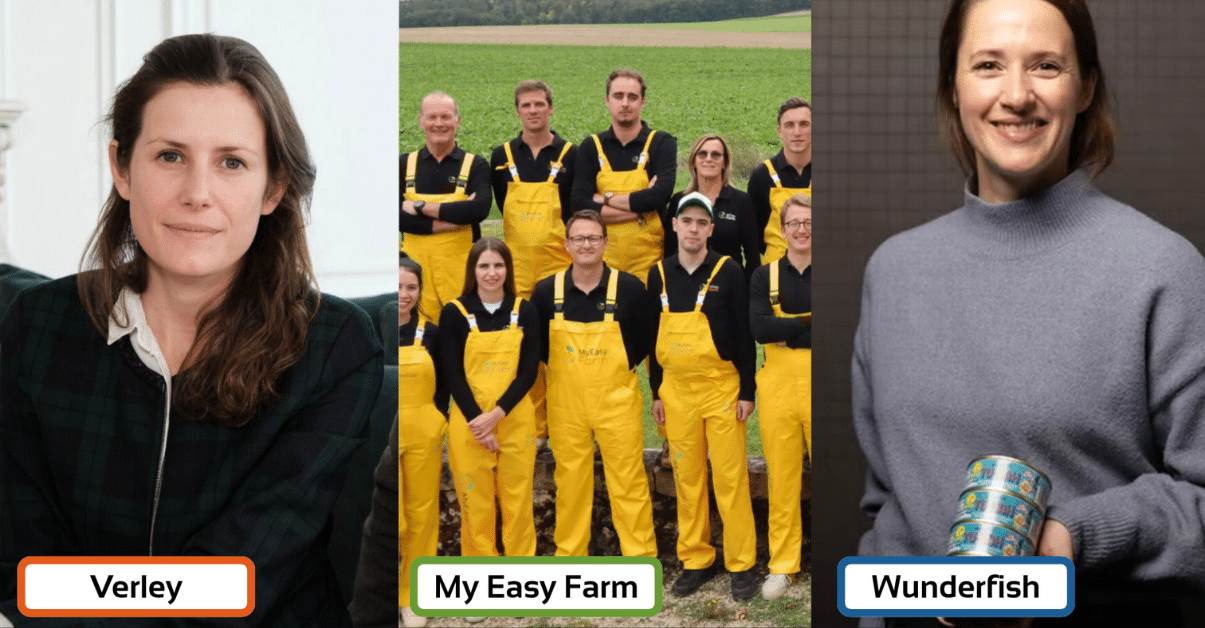At the cutting edge of food tech, three startups are turning their visions into impact—on farms, in oceans, and deep within the ingredients themselves. They are part of a growing ecosystem of innovators challenging what’s possible in how we grow, produce, and consume food.
From rethinking the role of the cow to digitising the path to low-carbon farming, to giving seaweed its long-overdue spotlight, Verley, MyEasyFarm, and Wunderfish are bringing radically different ideas to the same table. And they all have one thing in common: they’re building a food future that performs—for people and the planet.
Verley: The Reinvention of Milk
If milk is a staple, then Verley wants to make it smarter, cleaner, and radically more efficient. Formerly known as Bon Vivant, this French biotech startup is on a mission to transform dairy at the molecular level. Through precision fermentation, they produce milk proteins without animals—unlocking the same functionality and nutrition of dairy, without the environmental cost.
“Verley isn’t just a new name—it’s the start of a new chapter,” the team says. “We’ve developed FermWhey™, the world’s first portfolio of functionalized dairy proteins made via precision fermentation. Think high-purity whey, ultra-stable proteins for beverages, and cold-gelling variants—all plant-free and purpose-built.”
The proteins aren’t yet available on shelves, but they’re already creating waves in the B2B space. Verley plans to debut in the US market by 2027, with Europe and Israel soon after. As a proud EIT Food startup, they credit the platform for opening a rich ecosystem of corporate partners and early supporters. “EIT Food gave us visibility, but also critical connections to scale precision fermentation where it matters most: in food.”
From a name that honours French heritage to a science-led brand poised to go global, Verley is laying the groundwork for dairy 2.0—clean, scalable, and future-fit.
MyEasyFarm: Data-Driven Agriculture with a Climate Mission
Farming reimagined as data. That’s the premise behind MyEasyFarm, a French agri-tech startup creating digital infrastructure to drive regenerative and low-carbon agriculture. Their SaaS platform connects data from satellites, sensors, machines, and soil to generate real-time KPIs across the agrifood supply chain.
“Our goal is to help both farmers and agri-food groups measure, monitor, and verify the impact of their sustainable practices,” says CEO François Thierart. “From carbon farming to crop rotations, we enable science-backed, traceable outcomes.”
They’re not just helping partners track change—they’re driving it. MyEasyFarm has already established partnerships across Europe and recently announced a strategic collaboration with aivancity, France’s top AI and data science school. This alliance will accelerate AI integration across their platform, boosting environmental decision-making capabilities on the farm and in the boardroom.
With support from EIT Food and a growing list of RegenAg pilots, MyEasyFarm is shaping the back end of the future food system—where climate impact is visible, verifiable, and actionable.
Wunderfish: Known for innovating seaweed ingredient
Seaweed might be having its moment—but Wunderfish is building its movement. Based in Berlin and recently rebranded as Wunderfish GmbH, the startup behind TU-NAH is crafting a delicious rebellion against industrial seafood, one can at a time.
TU-NAH is their flagship product: a 100% plant-based, soy-free, and high-protein tuna alternative made with seaweed and fava beans. But behind its playful branding lies a serious purpose. “We’re regenerating oceans through seaweed farming and creating sustainable income for coastal communities,” explains co-founder Deniz Ficicioglu.
And people are eating it up—literally. You’ll find TU-NAH not only in major retailers across Germany, Austria, and Switzerland, but also in foodservice giants like Pizza Hut, Deutsche Bahn, and L’Osteria. Wunderfish was co-funded by the EU via EIT Food, and that support, they say, opened doors to product development partnerships and vital funding opportunities.
With milestones like 25 million touchpoints during Veganuary and the recent launch of SAL-NOM jars, Wunderfish is scaling fast while staying true to its mission. “Seaweed is more than an ingredient—it’s a force for good,” Ficicioglu notes. “And it’s time we brought it to every plate.”
A Shared Vision, Three Paths Forward
Whether by reengineering dairy from the protein up, decoding emissions from above, or redefining fish with plants from the sea, Verley, MyEasyFarm, and Wunderfish represent what happens when science meets soul. They’re not just changing what’s possible in food—they’re setting the pace for a sector that’s finally ready to move.
What unites them—beyond their bold ideas and tech-driven missions—is their participation in the EIT Food RisingFoodStars programme, one of EIT Food’s Entrepreneurship flagship programmes. This growth and support network is designed for Europe’s most promising agrifood innovators. Through this platform, they’ve gained access to strategic mentorship, market exposure, and a community of likeminded pioneers pushing boundaries across the food system. These startups remind us that innovation isn’t just about breakthroughs—it’s about building food systems that last.
Catch EIT Food at F&A Next
At F&A Next, EIT Food occupies a booth where startups will present themselves, and on May 21 (14.20, Stage 3) it hosts a panel discussion on the current investment landscape and policy momentum, followed by live pitches from pioneering food biotech startups.
